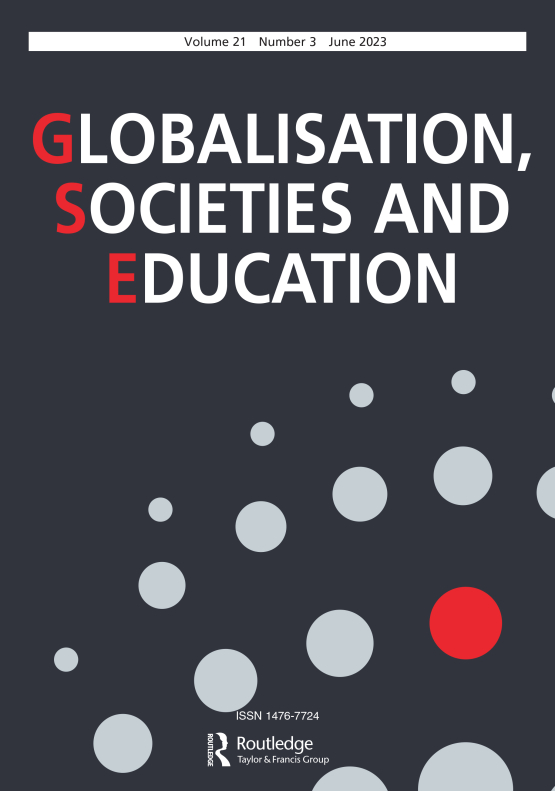Submit a Manuscript to the Journal
Globalisation, Societies and Education
For a Special Issue on
Edward Said - unsettling education in a fragmented world
Manuscript deadline
01 September 2024

Special Issue Editor(s)
Stephen Chatelier,
Faculty of Education, The University of Melbourne
[email protected]
Sophie Rudolph,
Faculty of Education, The University of Melbourne
[email protected]
Edward Said - unsettling education in a fragmented world
2024 marks the twenty year anniversary of Said’s final, posthumously, published book, Humanism and Democratic Criticism. It is a slim volume that articulates his argument for a form of humanism that is understood as a practice. To some extent, it is an attempt to show the political and ethical importance of a non-essentialist notion of the universal. Said takes to task conservative literary humanists whose gatekeeping of the literary canon fails to acknowledge a range of literatures from outside the West but also outside of power. Yet he is also scathing of the encroachment of ever fragmented and fragmenting identity politics within the academy, much of which he views as distortions of his arguments dating back to Orientalism. Instead, Said offers a defence of a notion of humanism that is democratic and open, rather than elitist and closed, and defiantly secular in opposition to anything that might otherwise attain the status of the sacred, including nationalisms. Such a disposition and orientation ensured that all commitments would always be subject to critique. Pithily and famously, Said wrote in this defence of humanism, that one must be critical of humanism in the name of humanism.
Said’s humanism as practice was always working against the ossification of one’s position in relation to politics and identity, while also resisting the kind of moral relativism that had captured not only much of the academy but also the general public with the advent of postmodernism. He would have, we suggest, been aghast at the state of intellectual life and public discourse in this era of social media with its penchant for simple binaries and identitarianism. And in the face of criticism of activist or politically engaged academic work, he would have demanded that the intellectual’s role was to speak truth to power rather than sit in ivory towers, passively enacting one’s complicity with power. This work of the public intellectual requires something more robust than simple university impact agendas through articles in The Conversation and ‘retweets’ and ‘shares’. Yet in response to identitarian scholarship, he would have called for a greater commitment to historicizing ideological positions, to solidarity with and between those on the periphery, and to a focus on relationality rather than on the fragmented and solidifying demands of particular groups.
It is for these reasons that the work of Said is worth revisiting now, twenty years after the publication of Humanism and Democratic Criticism. His worldly, secular, democratic criticism - that is socially, politically and historically conscious - is one best approached, thought Said, through the form of the essay. Said describes the essay as ‘a comparatively short, investigative, radically sceptical form’ (1983, p.26). Such criticism is needed for an era in which particular, narrow, notions of evidence that have become orthodox and, subsequently, disproportionately govern not only policy work but intellectual imagination, not least within the field of education. Such criticism has, arguably, increased in importance since Said’s death, given the problems of post-truth (in an era of evidence!), and a seeming allergy to universals such as equality and justice in favour of marking out the sacred boundaries of various identity positions that, too often, then demand the cancelling of those with whom they disagree.
Said’s defence of humanism was made in the context of specific challenges to Enlightenment humanism from poststructuralists, feminists, and racialized groups amongst others. And his defence of humanism was also mounted at the end of the Cold War and during an era of hope about the possibilities that globalization might bring for the world. Today, the questioning of humanism is not as apparent. For many, including the increasing number committed to a posthuman ontology, there is no longer a question to be asked. And the sentiment in today’s world is, perhaps, marked more by pessimism, even despair, than it is hope.
It is in this context that we wonder, to what extent might Said’s worldly, democratic humanism provide a way of seeing and acting in the world that resists neoliberal globalization and constructively aims at a world that is more just? In what ways might a form of Saidian hopefulness work to unsettle a world in a state of despair? And what might the implications of Said’s humanism and democratic criticism be for the way we think about and enact education in the current era of globalization?
Looking to Publish your Research?
Find out how to publish your research open access with Taylor & Francis Group.
Choose open accessSubmission Instructions
In this Special Issue to mark the twenty year anniversary of Humanism and Democratic Criticism, we invite essays that speak to the work, ideas, and methods of Edward Said and the implications for education today and into the future.
At a time when Said’s voice may well have been louder than ever in advocating for more robust readings, and unsettling, of the world as it is, we ask authors to essay (in approximately 3,000 words) a considered reflection on the value of Said’s thinking and praxis for education in this current moment. Essays should develop an argument that relates text to world and in the spirit of Said’s humanism, be critical, placing Said’s own ideas under interrogation and thinking about how well his theory and method has travelled across time and space over the past twenty years.
It is expected the Special Issue will be published in 2024 to align with the twenty year anniversary of the publication of Humanism and Democratic Criticism.